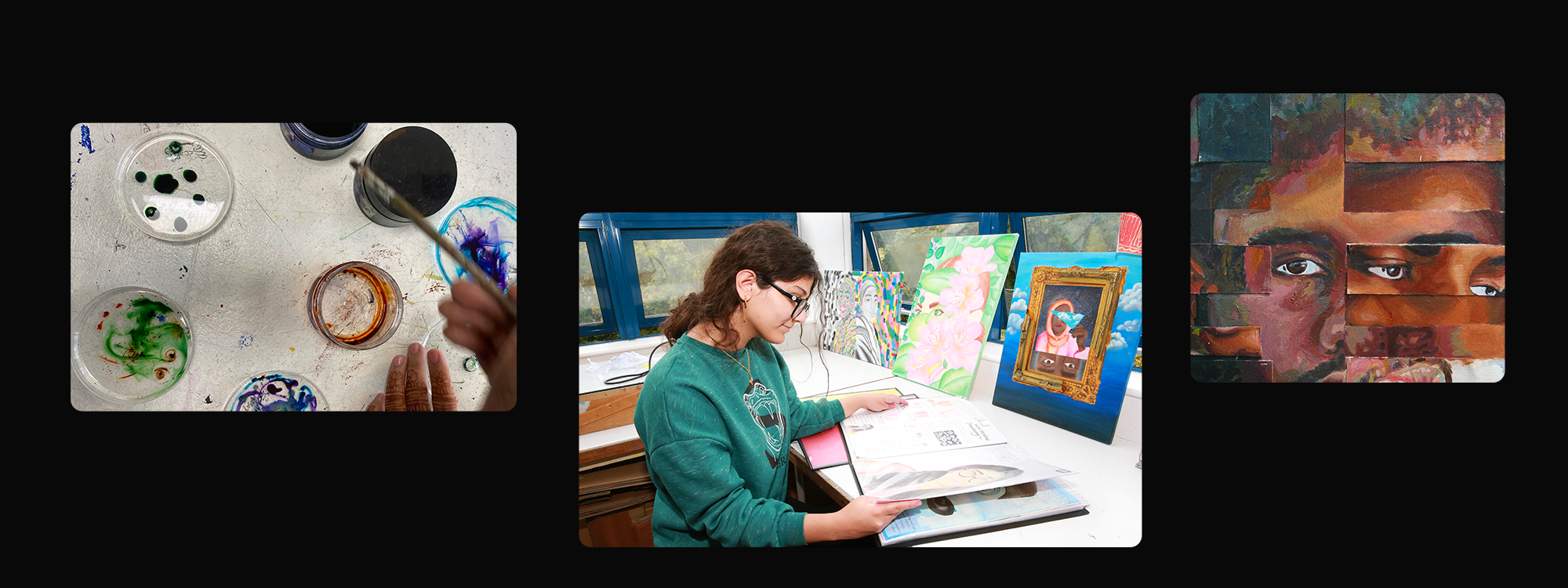- Home
- School Life
- Learning
- Art and Design Curriculum Overview
"Creativity takes courage"
Henri Matisse
The Art and Design department curriculum plans for every key stage are based on: the national curriculum, exam board specifications and creating enriching and ambitious opportunities which support and develop students in their next stage in the Art and Design industry.
Every KS3 project develops students’ practical and literacy skills in a transferable way to ensure they start their enrichment Year 9 phase with the core skills and knowledge to be successful. During Year 9, students learn a greater depth of skills within that subject discipline e.g. fine art: ceramics, textiles and 3D design: Electronics. There are many opportunities for students to collaborate between the fields within our curriculum plans.
During KS4, students work toward all assessment objectives using all the skills fed down into KS3. They understand the core principles and this is sequenced into their lessons to support their personalised projects where they refine skills and consolidate learning. Furthermore, students are prepared for KS5 as we deliver a range of literacy episodes in lessons for annotation and analysis to ensure students can confidently write their essay in KS5.
Our subject is ambitious as we teach core skills from KS3. We use a range of techniques and processes and build on these during every key stage. KS3 learn and revisit drawing, painting, printmaking and sculpture which are vital to teaching to the top and preparing them for their next steps.
There are a range of cross curricular projects and projects within the local area. We have just completed a Christmas card competition where a student has had their work printed on over 200 cards. We selected students to take part in the Saturday Art and Design club and have a new cohort starting this academic year. We took part in a community Mural project which is seen on the motorway and are currently in collaboration with a local primary school in another local mural project. We selected a group of year 9 students to take part in an enrichment artist in residence project as part of the Brent Cross Regeneration. We currently have many competitions at all key stages.
We run multiple trips every year including to the British Museum, Tate Modern, Tate Britain and Chelsea College of Arts.
Impact
-
We want students not only to be successful in their subject at GCSE or A Level, but to ensure students have opportunities and skills to be successful when they leave Whitefield School. Promoting not only skills learning in our practical subject, but also literacy skills so students can speak, read and write like experts in our field. Subject matter and conceptual understanding of our subject is vital when aspiring to become an artist, designer or critic.
Implementation
- Our curriculum develops students' skills in researching and responding to contextual resources e.g. artists and designers, experimenting with a range of skills and revisiting and refining these skills. In addition, recording through photography and drawing and consolidating learning through creating final outcomes. We have three main discipline areas: Fine Art, Textile Design and 3D Design.
- Regular assessments are carried out in line with our marking and feedback policy. WCF formative assessment is given every two weeks and summative numerical assessment every half term. Deep marking based on this numerical assessment is given every term. Through assessing all key stages against the assessment objectives, students learn the key four areas of development which ensures they are successful at KS4 and KS5.
- Our marking is informative and personalised to ensure students develop their personalised projects and can be creative and independent. We use low stakes assessments e.g. retrieval practice and green pen feedback to ensure students are correcting their mistakes. Furthermore, we stretch and challenge students through specific targeted questioning. Verbal feedback is used regularly. Through targeted assessment, we can then plan effectively and create interventions both in and out of lesson time.




